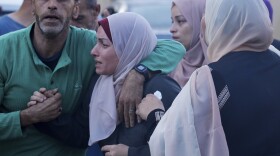
Lauren Frayer
Lauren Frayer covers India for NPR News. In June 2018, she opened a new NPR bureau in India's biggest city, its financial center, and the heart of Bollywood—Mumbai.
Before moving to India, Lauren was a regular freelance contributor to NPR for seven years, based in Madrid. During that time, she substituted for NPR bureau chiefs in Seoul, London, Istanbul, Islamabad, and Jerusalem. She also served as a guest host of Weekend Edition Sunday.
In Europe, Lauren chronicled the economic crisis in Spain & Portugal, where youth unemployment spiked above 50%. She profiled a Portuguese opera singer-turned protest leader, and a 90-year-old survivor of the Spanish Civil War, exhuming her father's remains from a 1930s-era mass grave. From Paris, Lauren reported live on NPR's Morning Edition, as French police moved in on the Charlie Hebdo terror suspects. In the fall of 2015, Lauren spent nearly two months covering the flow of migrants & refugees across Hungary & the Balkans – and profiled a Syrian rapper among them. She interviewed a Holocaust survivor who owed his life to one kind stranger, and managed to get a rare interview with the Dutch far-right leader Geert Wilders – by sticking her microphone between his bodyguards in the Hague.
Farther afield, she introduced NPR listeners to a Pakistani TV evangelist, a Palestinian surfer girl in Gaza, and K-pop performers campaigning in South Korea's presidential election.
Lauren has also contributed to The New York Times, the Los Angeles Times, and the BBC.
Her international career began in the Middle East, where she was an editor on the Associated Press' Middle East regional desk in Cairo, and covered the 2006 Israel-Hezbollah war in Syria and southern Lebanon. In 2007, she spent a year embedded with U.S. troops in Iraq, an assignment for which the AP nominated her and her colleagues for a Pulitzer Prize.
On a break from journalism, Lauren drove a Land Rover across Africa for a year, from Cairo to Cape Town, sleeping in a tent on the car's roof. She once made the front page of a Pakistani newspaper, simply for being a woman commuting to work in Islamabad on a bicycle.
Born and raised in a suburb of New York City, Lauren holds a bachelor's degree in philosophy from The College of William & Mary in Virginia. She speaks Spanish, Portuguese, rusty French and Arabic, and is now learning Hindi.
-
Health officials say the hospitals are out of electricity. The U.N. and World Health Organization pleaded for "decisive international action" to preserve what's left of the health care system in Gaza.
-
Five weeks into the conflict, we take a look at what happened in the region this past week.
-
Israel's counterattacks on Gaza have pummeled the territory's largest hospital. The Israeli military says Hamas' command center lies beneath it.
-
Prime Minister Benjamin Netanyahu was already under pressure for other problems. Now, a recent poll says 76% of Israelis want him to resign.
-
In a text message to journalists, a spokesperson from Israel's Foreign Ministry said "around 1,200" is now what he called "the official number of people" killed by Hamas militants on Oct. 7.
-
Israel's military and officials from Prime Minister Netanyahu's ruling party have acknowledged intelligence failures, and accepted responsibility for security lapses on Oct 7. Netanyahu has not.
-
Israeli forces have reached the coast of Gaza, splitting the besieged area in half and essentially cutting off the north from the south.
-
Twenty-five years after a Northern Ireland peace agreement, a controversial new law bans prosecution of crimes dating to the Troubles. Supporters deem it reconciliation. Victims see denial of justice.
-
Government officials and industry leaders convened an international summit in the United Kingdom to examine possible regulation of artificial intelligence.
-
Could artificial intelligence create bioweapons, undermine democracy and threaten the financial system? The U.K. hosts a global AI summit to seek answers and possible interventions.






